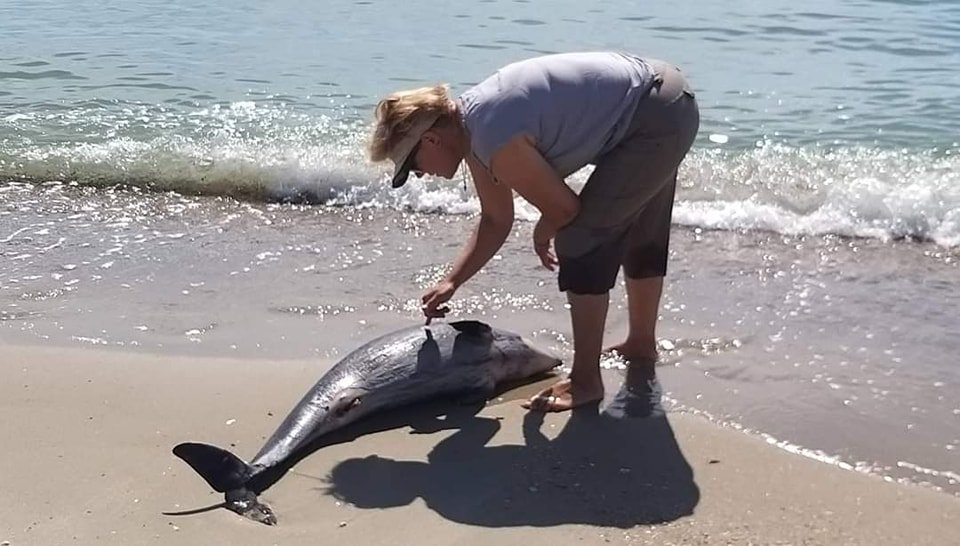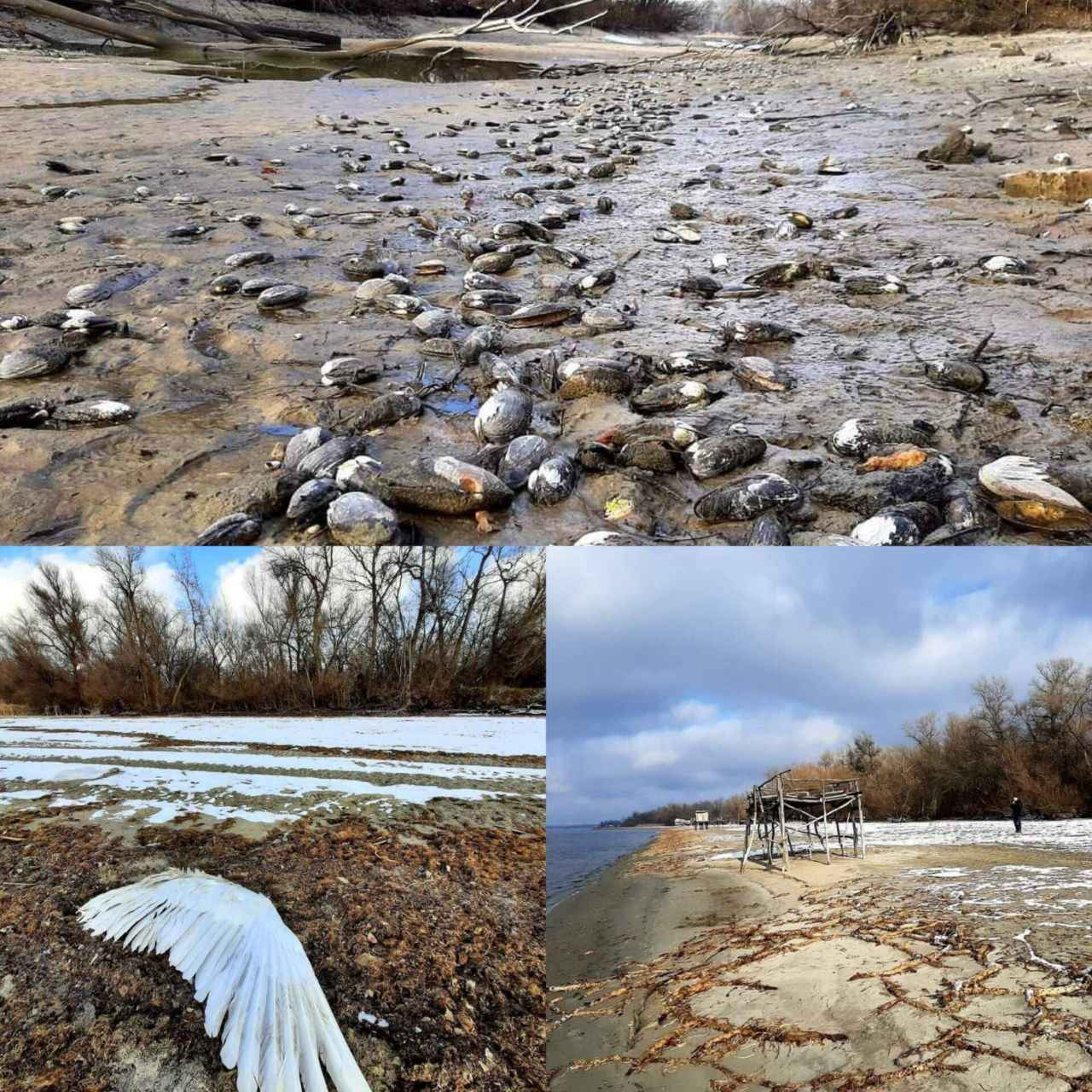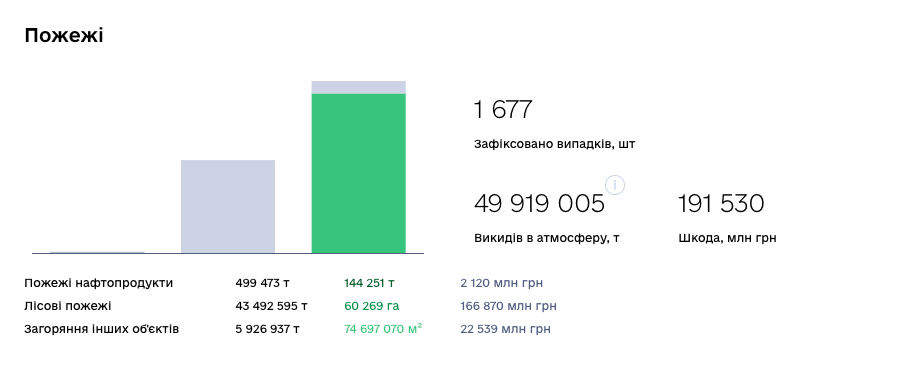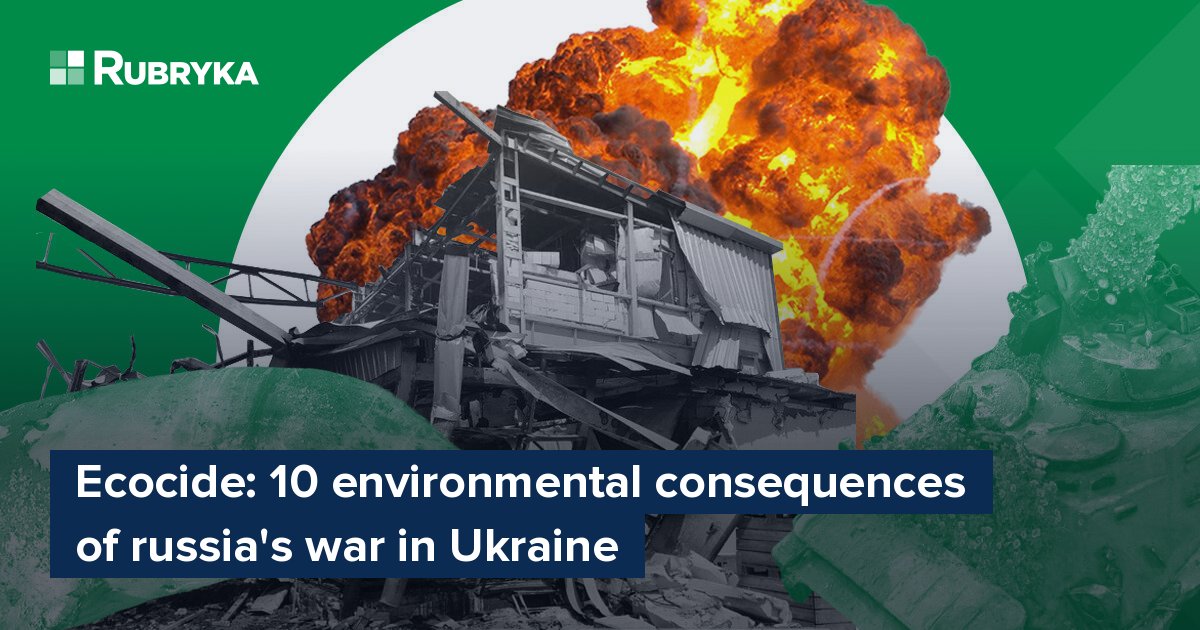
The Ukrainian government estimates the cost of ecological losses over the past year is at least $441 billion, and that russia should pay $51 billion in reparations. The current war is an unprecedented case of damage to the Ukrainian environment, the worst conflict that Europe has seen since the Second World War.
For the past year, the russian army has mercilessly shelled Ukrainian territories and, as a result, poisoned the lands with dangerous chemicals, reduced biodiversity, and disrupted entire ecosystems.
Rubryka spoke with scientists and ecologists about the incidents that have been the most destructive for the Ukrainian environment.
Destruction of the Oskil Reservoir
The Oskil Reservoir, located on the outskirts of the village of Oskil, in Ukraine's eastern Kharkiv region, is the tenth largest in Ukraine by area and volume. In October 2022 the dam was partially blown up by russians fleeing the advance of the Armed Forces of Ukraine. Water from the Oskil reservoir was supplied to the residents of Donetsk and partly of Luhansk. Blowing up the reservoir left some of the population without water, further worsening the humanitarian disaster.
After it was hit by a russian missile, the reservoir was almost completely depleted, losing 76% of its stored water. The inspection report also found that the reservoir's source ecosystem was damaged, causing harm to several species of fish and other wildlife.
Experts familiar with Ukrainian environmental protection efforts say the destruction of the Oskil Reservoir is one of the most significant examples of the russia-Ukraine war's impacts 9n the environment.
Mass deaths of dolphins in the Black Sea
Three endangered species of dolphins live in the Black Sea waters. About 20,000 dolphins die there every year, the most common causes being poaching nets and sea pollution. But this year, scientists from the Black Sea countries recorded increased deaths. Dead dolphins were also found in Ukraine, including in the Tuzly Lagoons, the largest national park in Europe, located in the south of Ukraine, in the Odesa region.
Scientists attribute the abnormal number of dolphin deaths to the presence of russian warships in the water area, which use sonars that emit powerful signals. These powerful and low-frequency signals affect the dolphin's inner ear, which dolphins use to be able to navigate, effectively, leaving the animals blind. Losing their acoustic senses renders dolphins unable to find their way around their environment and find food, and many eventually dying of starvation. The immunity of stressed dolphins weakened by sonar sharply decreases, which leads to more dolphins dying from infections.
Oil spills can also have a devastating effect — according to Ukraine's Ministry of the Environment, EkoZagroza, 11,000 tons of oil products were spilled into the sea during the past year of the war.
Ivan Rusev, a scientist at Tuzly Lagoons National Nature Park, estimates the number of dead dolphins at 50,000. Other marine scientists say the exact number will be known only after the accounting of dolphins in the water area, which is currently controlled by russia.

Draining the Kakhovka Reservoir by the occupiers
The Kakhovska Hydropower Plant in the Kherson region in the south of Ukraine, is part of the Unified Energy System of Ukraine. It provides peak load coverage, frequency, power regulation, and a mobile emergency reserve, making it an essential part of Ukraine's energy infrastructure.
The russian army has been shelling the hydroelectric power plant since the start of the full-scale war, and in November, they started draining water in the Kakhovka Reservoir, leaving the water level there at its lowest level in 30 years.
If the russians do not stop draining the reservoir, the water level will continue to fall, leaving multiple communities without water for drinking and agricultural needs. The Kakhovka irrigation system provides irrigation to the left bank of the Kherson region and partially to the occupied Melitopol district and the Zaporizhzhia region, is under threat.

An unfortunate collateral consequence of the war is the death of birds. Drained bare, the bottom of the Kakhovka reservoir is covered with birds. So far, environmentalists cannot conclusively determine the cause,, but among the possibilities are heart attacks that can result when animals are frightened by the loud sounds from explosions.
Destruction of the biosphere
During the past year of the full-scale war, 20% of Ukraine's nature reserves have been affected. The burning of the Kinburn spit, the "safari of the occupiers" on Dzharylgach Island and Askania, the shut Oleshkiv Sands, the destruction the floodplains of the Dnipro Delta, nature reserves razed and burned… it is difficult to list all the events at one time.
The war has had irreversible consequences on territories that are home to rare species of animals, birds, plants, fish, and insects.
Olena Popova, associate professor of the Department of Botany, Plant Physiology and Horticulture of Odesa National University, has studied how everything is interconnected in nature, and the consequences of an event in one place can manifest themselves even thousands of kilometers away. The war has led to the physical destruction of plants and animals as well as the territory's topography, mining, poisoning of the territory with chemical substances, and destruction of the objects of the nature reserve fund.
According to Ukarine's Ministry of Environment, 600 species of animals and 880 species of plants are threatened with extinction due to the aggression of the russian federation.
Destroyed water treatment facilities of Mariupol, Berdyansk, and other small towns of the Sea of Azov water area
In the spring of 2022, sewage treatment plants in Mariupol, Berdyansk, and other cities on the coast of the Sea of Azov were destroyed. This led to sanitary disasters due to the population's lack of clean water for domestic needs and drinking.
In wartime conditions, the risk of outbreaks of acute intestinal infections always increases, causing an uptick in diseases like hepatitis A, cholera, shigellosis, and others.
Valeria Shaginyan, head of the Department of Infectious Diseases Diagnostics and Parasitic Diseases of the State University Institute of Epidemiology and Infectious Diseases of the National Academy of Medical Sciences of Ukraine explains that water pollution results when instead of entering the sewers, sewage flows into rivers, mixes with groundwater, and eventually enters the sea.
Total mining of territories and destruction of soils
In Ukraine, much of the country's territory becomes inaccessible long after war has finished due to cover by landmines, which affects not only humans but also biodiversity, explains ecologist Maksym Soroka.
"Everyone talks about humanitarian demining. However, it is clear that ponds in forests and steppes will become "invisible victims" of these mines," Soroka told Rubryka.
Because of ongoing fighting in Ukraine, the normal life cycle of animal populations has been severely disrupted. Mammals do not like mating during artillery fire. This is also a long-term consequence — a crisis of the mammal population in natural ecosystems. It will end badly."
Another terrible consequence is the destruction of the most fertile chernozems – black soil deposits that are rich in minerals and highly fertile – of southern and eastern Ukraine. It is not the pollution of the grounds and chernozems that is evil, but their mixing with clay and whatnot. Future generations will have to deal with this problem.
Ecologist, zoologist, and activist Oleksii Vasylyuk says it is essential to talk about soil pollution. He notes that when agricultural areas are subjected to shelling, the toxic explosive chemicals can remain in the soil and contaminate plants and ground water for a long time. Foods grown on war-torn land can be unsafe to eat, and the only certain way to avoid the danger is to remove the land from agricultural use.
Global consequence: barbaric resource extraction
War's effects are most painful in the short term – but the totality of its consequences can take years to fully grasp. Scientists say that the effects of the current war must be analyzed comprehensively now in order to understand how current events will affect the future.
Soroka's research drew attention to the demand for steel, copper, tin, and oil products spurred by the war, and predicts worldwide wave of barbaric mining in the next ten years, which will have an uncountable effect on ecosystems worldwide.
Forest burning and fires
According to EcoZagroza, almost 50 tons of harmful emissions were released into the air due to fires in forests, cities, and oil depots that the russians bombarded at the beginning of the full-scale war.

The graph above shows the amount of harmful emissions due to forest fires, burning of oil products and other objects.
Soroka says that the burning of man-made and natural forests in the Donetsk, Luhansk, Zaporizhzhia, and Kharkiv regions will make these areas, already scarce in water resources, even more vulnerable to climate change. Now there will be trouble with the water balance, the scientist sums up.
Physical destruction of cities
Ukraine will also need a lot of resources for reconstruction. The physical destruction of entire cities — Mariupol, Irpin, Chernihiv, cities in the Kharkiv region, and Donetsk region, firstly creates a huge amount of waste, and requires bringing in even more natural resources to rebuild them.
While experts would like see Ukraine be rebuilt using more sustainable processes than those used in the past, sustainable rebuilding comes with challenges. "Everyone talks about green reconstruction, but even that requires metal, wood, cement," Soroka tells Rubryka. "Ukraine already needs as many building materials as we have spent in 10 years."
Destruction of science
One cannot underestimate the consequences of the destruction of science itself. This includes killing of specialists and the impossibility and deterioration of conditions for scientific research.
The full-scale war disrupted the work of many researchers and research institutions. In June 2022, more than 70% of Ukrainian scientists had to suspend their work and research due to problems with the supply of water and electricity, destroyed laboratories, forced evacuation.
Ecologists, conservationists, and eco-activists were either killed or left the now-occupied territories of the east and south. And they will not return. This is a tragedy.
Newsletter
Digest of the most interesting news: just about the main thing








